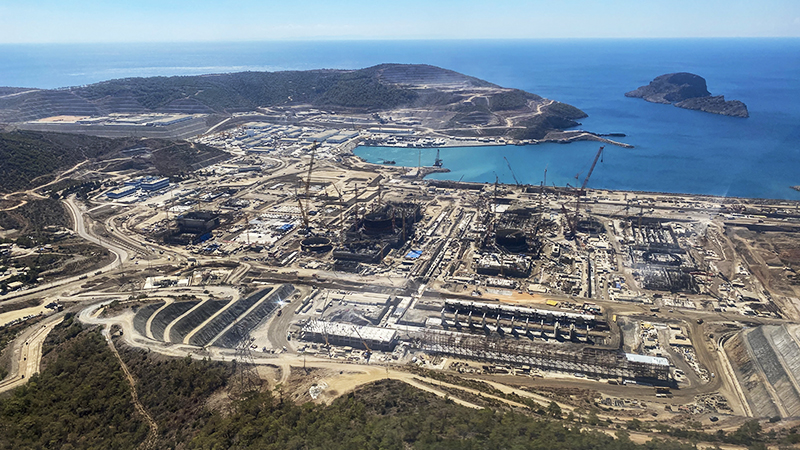Fatih Yurtsever*
Under a bilateral agreement signed between the Russian Federation and the Republic of Turkey on May 2010, Turkey’s first nuclear power plant will be built by Russia in Mersin-Akkuyu on the eastern Mediterranean coast. The nuclear power plant’s first unit, of which there will be four, will be operational in 2023. When the plant is completed, it will supply 10 percent of Turkey’s total electricity needs. However, some amendments to the agreement, which the Turkish parliament has not yet approved, will give Russia concessions in the eastern Mediterranean. What do these concessions consist of? How could these Russian gains lead to a national security threat for Turkey in the eastern Mediterranean?
The story of the Akkuyu nuclear power plant
The plan to build a nuclear power plant in Turkey dates back to the 1980s. However, the lack of both financial resources and interest on the part of foreign investors prevented the plan from moving forward at the time. The first tender for the Akkuyu nuclear power plant was held in 2008. In addition to Western companies, Turkish company Ciner Enerji and Russia’s Rosatom participated in the tender as a consortium. With the exception of the Ciner-Rosatom consortium, all bidders withdrew from the tender, and the consortium was awarded the contract. Due to a complaint lodged by the Turkish Union of Engineers and Architects Chambers that the tender was not conducted in compliance with the relevant law, the Supreme State Council cancelled the tender in 2009.
After the cancellation of the tender, negotiations between Turkey and Russia began at the intergovernmental level. On June 28, 2010 an agreement on the construction of the nuclear power plant by Rosatom was approved by parliament. This agreement established Akkuyu Nuclear Santral A.Ş. on Dec. 13, 2010 to construct and operate the plant.
Russia wants to have a port in Akkuyu
Parts of the agreement were amended by the board of Akkuyu Nuclear Santral A.Ş. on March 12, 2019. According to the changes, the company has the right to construct ports and terminals for maritime transport, storage and loading and offloading. The majority of the company’s board members are Russian, while only one member represents Turkey. For this reason, the decision favored Russia. This change is not legal since the original agreement was approved by the Turkish parliament, so the company’s board of directors does not have the authority to change it.
But with the board’s decision, Russia was granted the necessary approval to build a commercial port in Akkuyu with the support of the Erdoğan administration and without the approval of the Turkish parliament. Under normal circumstances, a nuclear power plant needs a port exclusively for transporting nuclear materials. However, the privilege granted to the Russians here goes far beyond the construction of a port for the transportation of nuclear materials. It also includes constructing a commercial port that can be used as a forwarding base to meet the logistical needs of Russian naval ships in the Mediterranean.
Protection of the Akkuyu nuclear plant
Another significant development regarding the Akkuyu nuclear power plant occurred this month. Akkuyu Nuclear Santral A.Ş.’s sole Turkish board member, Cüneyt Zapsu, filed a lawsuit against the company, claiming that some board decisions were made at meetings he did not attend. The petition submitted to the court was first revealed to the public by lawyer Salim Şen on Turkish TV channel TELE 1. The board of Akkuyu Nuclear A.Ş. decided to sign a contract with a Russian security company to set up an air radar to protect the plant. Zapsu objected to this, saying: “Since I believe the installation of the radar is not compatible with the security policy of the Republic of Turkey, the issue should have first been coordinated with Turkish authorities and then submitted to the board.”
From a military point of view, it is not enough to install only an air search radar to protect the nuclear power plant against air threats. In addition to the radar, a surface-to-air missile system capable of countering air threats should also be installed. For this reason, it is assumed that Russia intends to establish a search radar and an S-400 high-altitude air defense system in the Akkuyu region. However, this is not explicitly mentioned in the board’s decision.
Conclusion
Turkey is currently struggling with a severe economic crisis. For the Erdoğan government, winning the 2023 elections has become a matter of life and death. NATO and EU countries are imposing sanctions on Russia over its invasion of Ukraine. The Erdoğan government is helping Russia circumvent the sanctions. In return, Russia provides financial support for relief of the Turkish economy through Akkuyu Nuclear Santral A.Ş. Turkey is likely to face a major problem that threatens national security, which is that Russia could have a naval base in the eastern Mediterranean using the Akkuyu nuclear power plant, stationing an air radar there and deploying the S-400 air defense system. Unfortunately, Russia is step by step settling into the eastern Mediterranean, taking advantage of President Erdogan’s ambitions to win the upcoming elections.
* Fatih Yurtsever is a former naval officer in the Turkish Armed Forces. He is using a pseudonym out of security concerns.


